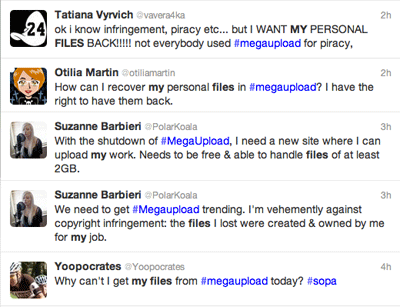After yesterday’s dramatic, international sting operation, the people behind Megaupload are in custody, their Web empire and fancy cars having been seized by authorities. Founder Kim Dotcom and his associates are charged with piracy on a massive scale, among other things.

As for Megaupload.com, the site is inaccessible, perhaps indefinitely. That’s a bummer for the millions of people who used it to share copyrighted albums, movies and software. It’s an even bigger let down for users who used the service to store personal files, sometimes without a backup.
While the site was indeed used for illegal activities, many uploaded their personal documents, work files and multimedia to the service, using it for remote access much like services like Dropbox and Box are used. After the shutdown, many users started complaining via Twitter that they were no longer able to access their files, as Torrent Freak reported.
It’s a painful lesson for those users, who may never see their files again. It’s also a reminder to the rest of those of us who use the Web everyday that online file storage is never a substitute for safely backing up data on a local hard drive, far away from the cloud. Granted, legitimate personal file storage services like Dropbox, YouSendIt and the countless online backup providers probably won’t get raided by the FBI, but that doesn’t mean some catastrophic event couldn’t result in downtime.

To some, it’s hard to have sympathy for people who thought Megaupload was a safe place to store personal files, especially given the controversial nature of the site. Yet for a lot of rank-and-file users of the Web, there is a certain inherent, blind trust given to Web-based services. They keep their email in the cloud, their calendars, their social contacts and activities. Seldom does anything disappear out of thin air. In the case of Megupload, the site offered premium accounts, which users paid for. Surely a service for which you shell out money couldn’t just disappear overnight. Could it?
Megaupload’s takedown may be on the more dramatic end of the “what if” scale, but there’s no guarantee other services won’t go down for any number of reasons. If backing up one’s local hard drive to an external device is a no brainer, doing the same for cloud-hosted data should be even more imperative.

















